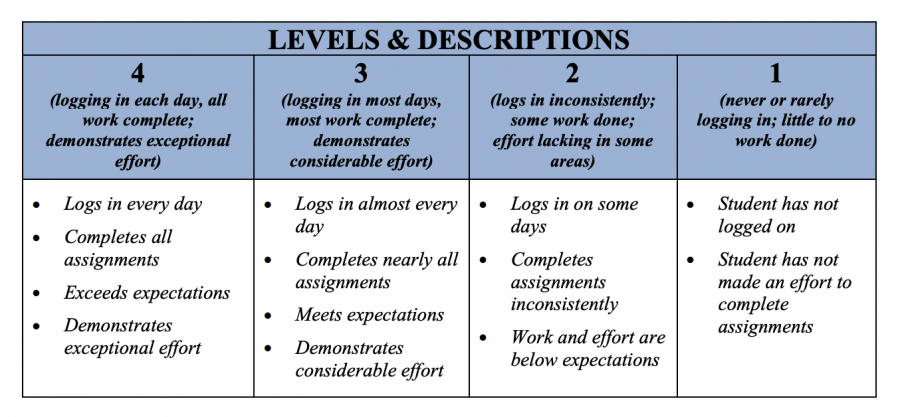School from Home: A Guide for Students
The levels of grading for fourth quarter progress reports Credit: Huntington Union Free School District
April 28, 2020
On May 8th, fourth quarter progress reports will be released for all Huntington High School students and families. The situation is a little bit different than it was for last quarter’s progress reports, which were completed just before the district closed in mid-March in response to the COVID-19 pandemic that has since infiltrated every corner of the United States. This time around, teachers will include comments for each student, their choices being:
- Has been handing in all of their work and engaging consistently in distance learning.
- Has been handing in most of their work and engaging in distance learning.
- Has turned in satisfactory work and could be more engaged in distance learning.
- Has not been turning in their work and engaging in distance learning.
What does this mean for students? Teachers have been giving forewarnings, so if you haven’t been doing your work or waking up for live sessions, you still have time to turn it around. Honestly, most meetings don’t last longer than half an hour (since teachers have to meet with every section within their allotted 60 minutes), and attending them is usually worthwhile. They’re used as review and Q&A sessions, and they’re immensely helpful. They also help add structure to your day, having you to start your day at 9:00 a.m. and continue from there on out. I would recommend you to attend as many as you can because it’s an easy way to earn participation points and it really can reduce the stress that comes from learning at home.
Teachers have been advised to limit classwork to 30 minutes a day, but this isn’t exactly a guarantee. Some teachers assign an hour’s worth of work, but make it due in two days. It’s expected that students spend a half hour each day working on the assignment, but teenagers are master procrastinators and the majority will tell you that they do all of the work on the second day. It seems we’re just attracted to the idea of stress, but time management really is a difficult skill to master, especially when there’s no one other than yourself to hold you accountable. If you can, try to start your assignments the day that they’re due. Maybe even finish it on the first and relax on the second day when you’re work-free. It feels great, trust me.
With regents exams, SATs, ACTs, and all other standardized tests canceled for the rest of the 2019-2020 school year, AP Exams are the only tests students have left to worry about. The format is vastly different this year: the exams will be administered online, with security measures such as only being able to open two windows at a time. While it’s warned that repercussions for cheating will be severe, the tests are completely open book and will only be 45 minutes long. For AP Language courses, students just have to engage in a two-minute conversation and orally present a cultural comparison for another two minutes. Four minutes of your life determines whether you earn a college credit for which you paid $94. Things are crazy. That being said, you may be assigned more than 30 minutes of work each day: I’ve had to watch College Board review videos on YouTube, which usually last around 45 minutes, on top of doing short term and long term review assignments. It can feel overwhelming, but think about it this way: your teachers really care about you. They want to see you succeed and fully prepare you for what is most likely the strangest situation they’ve encountered in their career. Put in the same amount of effort as they are, and hopefully, you’ll see it pay off in mid-May when exams take place.
It was announced that fourth quarter report cards for Huntington students will now be pass/fail, based on our work since being at home. This was not a rash decision on anybody’s part and was of great discussion for several weeks; from what I understand, numerical grade values are the better option when it comes to college applications, but surely colleges will understand that the Spring of 2020 can’t serve as an accurate representation of how a student performs in school. Additionally, our final course grades for the year will still be out of 100 with weighting. To clarify, take this quote from Principal Cusack: “…the end result, meaning the final course grade that displays on transcripts, will have a numerical value based upon marking periods 1,2, and ¾. We are finalizing the weightings and point values but this system is ultimately designed to reward students for effort while ensuring they remain engaged with school and that they also remain competitive in terms of college acceptance.”
I had a conversation related to the new system with a few friends the other day, some of whom argued that we need a grade to validate our work and to track our progress, while others felt that a pass/fail grading system was the fairest for our current situation. I’m not too sure where I lie on the spectrum because as much as I have enjoyed learning and working without the pressure of having to keep my numerical grades up, I understand that students need to be held accountable for putting in the effort. Really, that’s all we’re being graded on right now-effort-and I think it has to be that way until we’re back on campus. Whether we make it back to Oakwood and McKay Roads or not, my hope is that we, as a community, continue to work together to make this time as tolerable and productive as possible.

